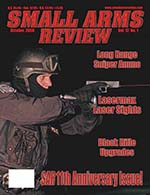By Robert M. Hausman
On June 26, 2008, the Supreme Court affirmed, in a 5-4 decision, the ruling of the U.S. Court of Appeals for the D.C. Circuit that the Second Amendment protects a pre-existing, private, individually-held Right to Keep Arms and to Bear Arms, without regard to a person’s relationship to a militia.
Almost immediately, firearms civil rights advocates, most notably the National Rifle Association, took to the courts to attack onerous firearms regulations in other regions. The day after the Supreme Court decision, the NRA filed five lawsuits challenging local gun bans in San Francisco, and in Chicago and several of its suburbs.
“The Supreme Court held yesterday that the Second Amendment right is exercised individually and belongs to all Americans,” said NRA-ILA Executive Director Chris W. Cox. “These lawsuits will ensure that state and local governments hear those words.”
The San Francisco lawsuit challenges a local ordinance and lease provisions that prohibit possession of guns by residents of public housing in San Francisco. NRA is joined in that suit by the California Rifle and Pistol Association and the Citizens Committee for the Right to Keep and Bear Arms.
The Chicago case challenges a handgun ban nearly identical to the law struck down in Washington, D.C. The other Illinois suits challenge handgun bans in the suburban towns of Evanston, Morton Grove, and Oak Park. All five suits raise the issue of the application of the Second Amendment against the states through the Fourteenth Amendment, known in constitutional law as “incorporation.” Because Washington, D.C. is not a state, incorporation was not specifically addressed in the Supreme Court decision in District of Columbia v. Heller, but the decision did repeatedly equate the Second Amendment to the First and Fourth Amendments, which have applied to the states for 80 years.
“In Washington, D.C. or in any state, whether you live in the housing projects or a high end suburb, you have the right to defend yourself and your family at home,” Cox concluded. “These laws all deny that right, and NRA will not rest until they are all struck down.”
The city of Wilmette, Illinois quickly suspended enforcement of its 19-year-old ordinance banning handgun possession in the wake of the U.S. Supreme Court decision and was thus not named in the NRA suits.
While not the subject of a suit at press time, the state of Massachusetts requirement that guns be kept either with a trigger lock or be secured in a locked container in the home could become subject of a suit in the near future as that state’s law is similar in scope to Washington’s requirement, which was struck down.
Wayne LaPierre, NRA’s executive vice president, explained, “The NRA is filing lawsuits against cities in which gun ownership is banned, to restore individual freedom for the lawful Americans who live there. Because freedom for some Americans, and not for all, isn’t freedom - it’s discrimination. And it’s wrong. The freedom to bear arms belongs, individually, to every law-abiding American. It always has, and the NRA will keep fighting to preserve that fundamental right.”
The narrow Supreme Court victory, by a 5 to 4 majority, should be a reminder about the importance of this presidential election. As the Wall Street Journal noted, “With the next President likely to appoint as many as three Justices, the right to bear arms has been affirmed but still isn’t safe.”
Anti’s Vow Defiance
Hardcore anti-gun politicians held their ground, issuing statements of defiance. “President Bush’s radical Supreme Court justices put rigid ideology ahead of the safety of communities in New Jersey and across the country. This decision illustrates why I have strongly opposed extremist judicial nominees and will continue to do so in the future,” said Senator Frank Lautenberg, D-New Jersey.
“While the Supreme Court has ruled, not unexpectedly, that individuals have a right to bear arms, the court clearly allows for reasonable regulations like the Brady law and the assault weapons ban. It is my hope and belief that the ruling will not change much in terms of how the states and the federal government are allowed to regulate guns,” said Sen. Chuck Schumer, D-N.Y. “I am profoundly disappointed in Justice Roberts and Justice Alito, both of whom assured us of their respect for precedent. With this decision, 70 years of precedent has gone out the window. And I believe the people of this great country will be less safe because of it,” lamented Sen. Dianne Feinstein, D-Cal.
“While it ruled that the D.C. gun ban went too far, Justice Scalia himself acknowledged that this right is not absolute and subject to reasonable regulations enacted by local communities to keep their streets safe,” said Sen. Barack Obama, D-Ill, the Democratic Party’s hopeful for U.S. president.
The author publishes two of the small arms industry’s most widely read trade newsletters. The International Firearms Trade covers the world firearms scene, and The New Firearms Business covers the domestic market. Visit www.FirearmsGroup.com. He may be reached at: FirearmsB@aol.com.
This article first appeared in Small Arms Review V12N1 (October 2008) |
| SUBSCRIBER COMMENT AREA |
Comments have not been generated for this article.



